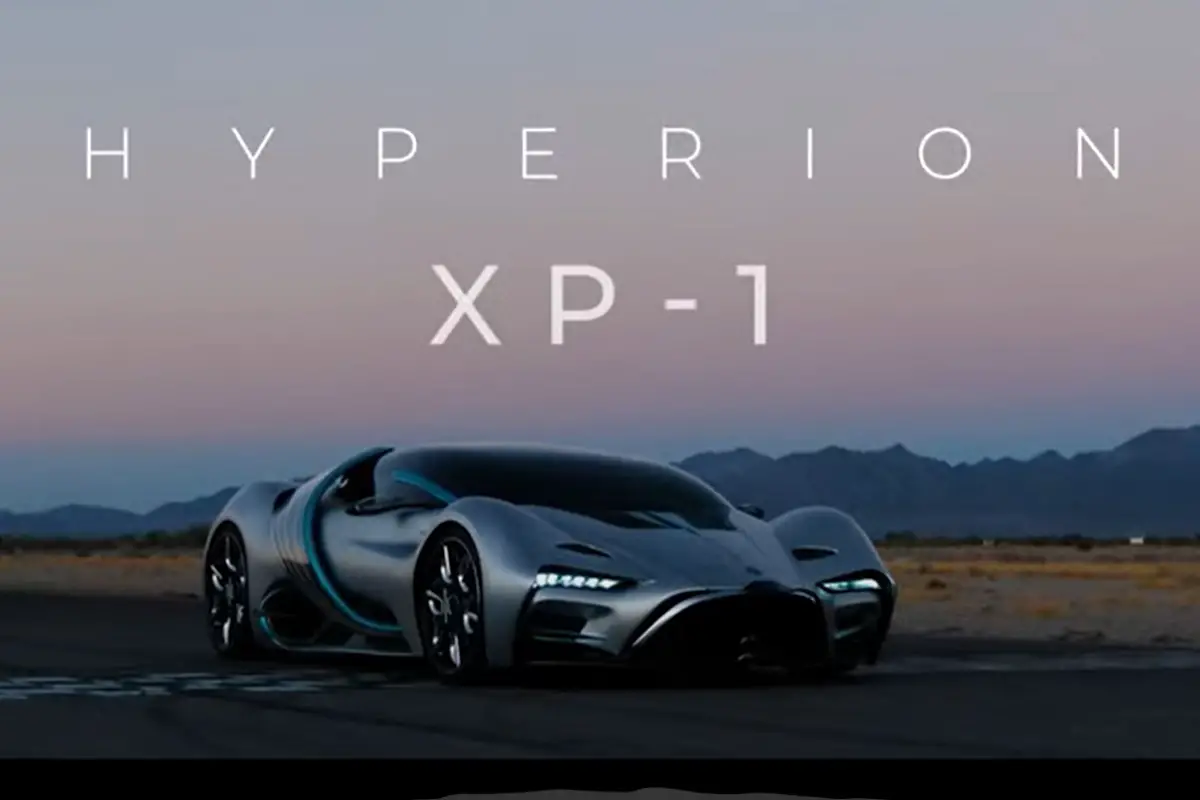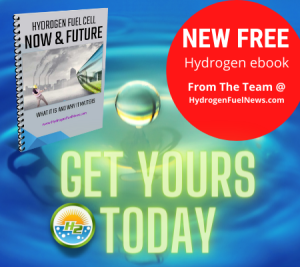
Hyperion XP-1 hydrogen car unveiled with 1,000-mile range
November 28, 2022The Hyperion XP-1 is a futuristic fuel cell vehicle designed by Hyperion, a startup based in California. It boasts a range of up to 1,016 miles per tank, a refuel time of under five minutes, and a combined power output of over 2,000 horsepower. Its lightweight design, made possible by a carbon titanium monocoque structure and lack of a substantial battery pack, allows it to accelerate from zero to sixty mph in only 2.2 seconds. Hyperion has not yet set a release date or pricing for the XP-1.
This new H2 vehicle from the startup based in California boasts 2,000 horsepower.
The Hyperion XP-1 was first announced in August 2020 and while the specs promised at that time looked very appealing, the public debut of the hydrogen car at the Los Angeles Auto Show gave it the chance to show off what it’s really about.

This new model of fuel cell vehicle looks like a design straight out of science fiction.
The Hyperion HP-1 prototype drew substantial attention as it showed off its futuristic styling. This design drew mixed reviews, with some enjoying its sleek uniqueness while others simply found it too weird. It isn’t difficult to see why it would appeal to some and not others. The entire look is unconventional, with atypical proportions, wild intakes, and shapes jutting outward from the bodywork, including the solar panel-covered adjustable blades.
This hydrogen car boasts a range of a whopping 1,016 mile (1,635 kilometers) per full tank. The H2 tank is carbon fiber and can be refueled in under five minutes. The powertrain is made up of fuel cells and instead of batteries it has supercapacitors, as well as a three-speed transmission and four axial-flux electric motors that drive all four wheels.
Los Angeles Auto Show 2022
There is over 2,000 hp of combined power output, making it possible to achieve a zero to sixty mph (0-100 kilometer per hour) acceleration in only 2.2 seconds, with a 221 mile per hour (356 kilometers per hour) maximum speed.
The XP-1 hydrogen car is notably lighter than electric hypercars, at only 2,275 pounds (1,032 kilograms).
Much of the weight savings is credited to the vehicle’s carbon titanium monocoque structure, as well as the titanium-reinforced composite bodywork, aluminum alloy suspension, and the fact that it does not require a substantial battery pack.
How Many Units Will Be Built and When Will Production Start?
Hyperion’s goal is to build 300 units of its XP-1 hydrogen car in the United States. It has not yet set the pricing for this vehicle but expects to release the amount at a later time. Originally, the goal was to start production of the vehicle at the start of 2022. That said, it’s clear that the California-based startup has postponed that timing.
The Hyperion XP-1 serves as a futuristic and promising fuel cell vehicle that has captured the attention of many car enthusiasts. With hyper speed potential, a range that surpasses many contemporary vehicles, and a lightweight design that distinguishes it from other hypercars, the XP-1 has set a new standard for the industry. Despite the postponement of its production start date, Hyperion’s goal of building 300 units of XP-1 hydrogen car in the United States is a testament to the company’s commitment to push the boundaries of innovation in the automotive industry.



 With over 15 years of reporting hydrogen news, we are your premier source for the latest updates and insights in hydrogen and renewable energy.
With over 15 years of reporting hydrogen news, we are your premier source for the latest updates and insights in hydrogen and renewable energy.
I feel this is a fantastic development. Hydrogen cars are the future in my opinion. I have had electric cars since 2011 (Chevy Volt 2011 and 2017), and I like them. The problem is the lack of long distance range capacity and length of time for charging. Hydrogen solves both problems.
Is this a private company? Can’t find a trading symbol. What is the website?
Once ready to sell, will they have a federal and or state subsidy if one wants to buy one of their cars?
“What do you think is the BIGGEST problem stopping the world from using more green hydrogen?”
You left out the greedy rich people that cannot see a future without war and the myopic politicians that are sell outs.
How is making money off of Hydrogen ANY different than fossil fuels?
Only thing is you do NOT have to search for it, build big extremely expensive ways of getting it,transporting it,processing it then transport it again.
Hydrogen can be made and used LOCALLY. NO mega grid.
When a large company like Amazon or usps or Walmart commits to green hydrogen fleets and installs the infrastructure on top of gas or natural gas and cars are available and affordable and people understand hydrogen cars are non-polluting the use of hydrogen will skyrocket
Love this technology I am all in. I do see problems with the rejection of a logical solution for our energy needs for this planet. Powers in place now will fight you to the death on this one unless you let them in for the ride to cash in too. This technology can replace power generation systems too.
Yet another article focusing on the USES of hydrogen.
The big issue isn’t finding uses for hydrogen – the problem is isolating it!
“Hydrogen is the fuel of the future”, and always will be.
Using vast amounts of electricity to isolate hydrogen, rather than use it to charge is EVs, is so clearly inefficient you have to wonder why it is tactfully ignored here.
We need low-emission cars NOW. Focusing on cars like this is a distraction when we have a solid solution now.
Farmers in Iowa have been using Hydrogen On Demand (Water As Fuel) for years
That opinion is a bit too simple. There are not enough rare earth minerals to produce battery cars for everyone. If hydrogen can be distributed safely it is the answer.
It is a safer fuel then petroleum. If the tank leaks or opens the hydrogen goes up quickly.
Why can’t we use electricity generated by solar panels to isolate hydrogen?
that’s what Elon Musk USED TO SAY
There is a simple and PROVEN answer to cheaply and SAFELY generate the electrical needs to produce not only green hydrogen, but desalinate water (California…). It was proven safe and efficient in the 50s! I’m referring to Thorium molten salt reactors (TMSRs). TMSRs use TH232 which cannot be proliferated for nefarious (weaponized) means. During a rare but possible thermal event during a reaction it simply routes to another chamber stopping the reaction: no nuclear events! The one constant concern is containing the Gamma radiation (no more Bruce Banners…) but instead due to the wartime mindset and political desire for Plutonium, Thorium has not only taken a backseat but booted from the car! A TMSR could be built in the same space as a coal fired plant reducing the need for infrastructure to support the grid. Thorium can consume existing radioactive waste material from traditional nuclear power plants that don’t even use 30% of the nuclear material needed to generate power reducing the need to store highly contentious nuclear waste. Thorium also generates valuable medical by products. Thorium is widely available and much easier to handle than Uranium. Seriously, it can not only solve the power generation needs to produce Hydrogen but so many other benefits as well.
The biggest impediment to the public embracing H2 vehicles it the concern the public is likely to have about how – or perhaps Where – to “Fill ‘er up!” If there was more options to fill the hydrogen tank, then more might choose EVs powered by fuel cells instead of heavy and environmentally damaging batteries.
As long as fossil fuel companies control the economy, electric cars will keep growing in popularity, because gas or electric makes little difference to Big Fossil. The US electric grid is ~60% reliant on fossil fuels, so despite the car being electric, the fuel that powers it will still be fossil. Eventually, Big Fossil may be forced by the government to transition to hydrogen as the world keeps warming up, and they will make sure to remain its main producers, suppliers and transporters while building the new infrastructure.
The elephant in the room is the production of nitrous and nitric oxides as air is predominantly nitrogen.
Like all alternatives the gold standard was and still is set by fossil fueled vehicles, competitive pricing and practicality. Hydrogen has many similarities to fossil fuel cars which meets one of the two gold standards where EV’s doesn’t meet either. One can only hope that there will be enough financial backing to build up the infrastructure and hopefully bring down the cost of hydrogen and green ammonia alternatives.
The problem is that the government receives billions in taxes generated by the sale of fossil fuels, which it would stop receiving if we switched to hydrogen.
To much negative crap from those who don’t understand . I can see that electric cars is not negotiable at any time . In Australia if some one has electric car and has a caravan the electrics will run out of battery power no holiday cannot get to there destination one dead lose of a holiday just a bunch of headaches
I think even though the Hydrogen technology is starting out well after the electric cars that it is more attractive than electric because of its fuel and range. There is more to learn but at this point I would prefer Hydrogen over electric cars.
I enjoyed reading all these comments and most make sense. But there has to be more education to the masses. What good is it to build 300 cars at $300.000 each. What we need is 3.000.000 at $30.000 each then it will have an impact. Shell just closed their hydrogen stations in Brittan for lack of customers. Production on site with rooftop solar and a view wind turbines at each filling station would be a start.
The biggest issue facing hydrogen technology is the scarcity of fueling stations. Electric cars, despite their lack of range are popular as electricity is ubiquitous. This is the old chicken and egg dilemma. What came first? One will not buy a hydrogen car if they gave no means to fuel it. That is why hydrogen makes sense for localized fleets and busses where the vehicles can be refueled at a centralized location daily. If we truelly wanted hydrogen cars, our government would spend those green energy dollars on hydrogen fueling stations across the country
Efficiency is determined by the weight of the vehicle. Hydrogen vehicles are inevitable. The convenience aspect is obvious. Hydrogen is safe because its weight takes it away from causing harm instantly. Hydrogen will solve all the problems.
Hydrogen Combustion is the way to go, the research and development needs to got into splitting of (Hydrogen Oxygen) on-board the vehicle. The Oil companies, and the Government are the drawback.
Is the battery in a Prius big enough to store the power from hydrogen? Is internal combustion and better than fuel cell? Is a Prius run by a fuel cell on hydrogen a good idea?
The Hydrogen car of the future in my opinion should be available for everyone with a lower price range where everyone can enjoy it or kits for cars and trucks to be modified.
1. Design is stunning and seem functional.
2. Material cost will make it expensive to build but, at the same time, will provide for longevity.
3. Maintenance issues will present themselves and require trained technicians to be able fix failures on the vehicle, which will restrain where one will operate the vehicle.
4. The mobile fueling concept provides flexibility.
Such a fantastic information. This is honestly very useful for bloggers
I think New Zealand has at least one green hydrogen production base at Mokau in the North Island.If my country could take the lead of producing green hydrogen fuel there must be a way of exporting it as well which would help so many more countries.
I’m not avare of à Green solution available.Certainly not EVs. Electricty is mostly create with diesel, batteries are heavily polluting both at manufacturing and dismantling… loads of heavy metals in the air we breathe…
Sûre worse than oil when it comes to Green